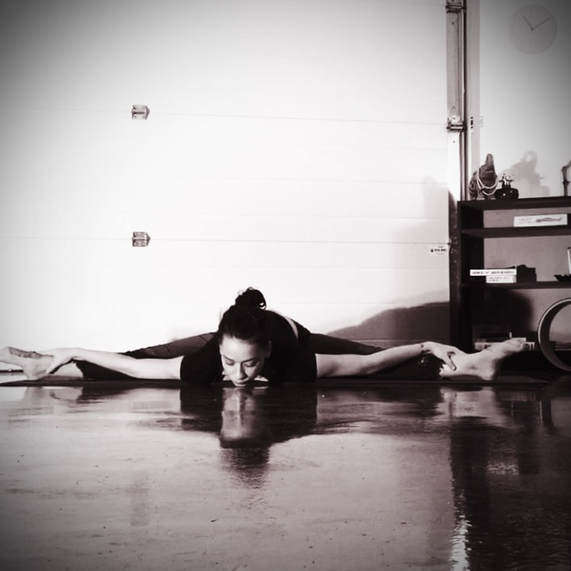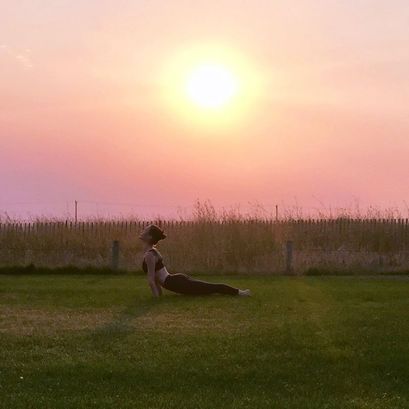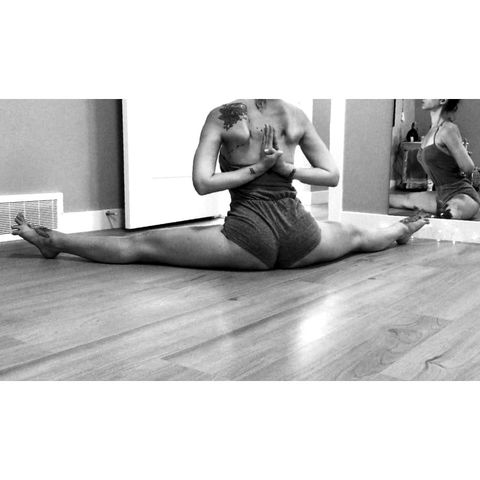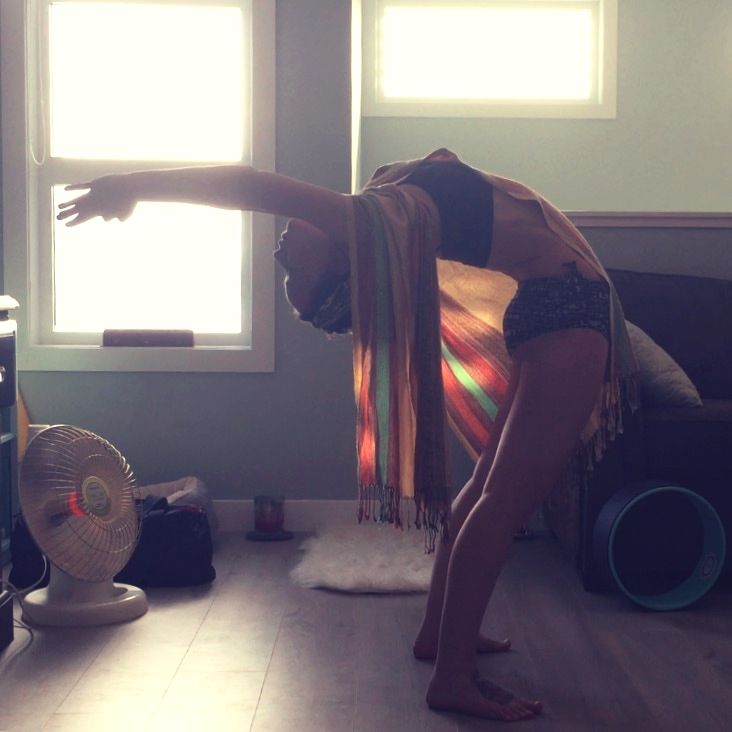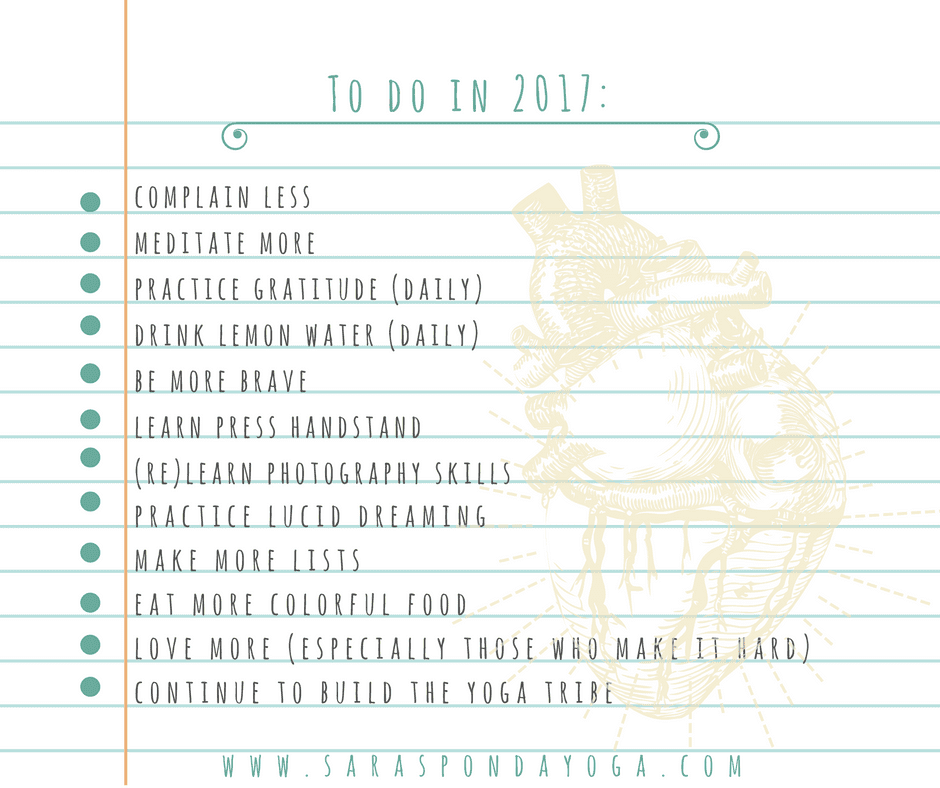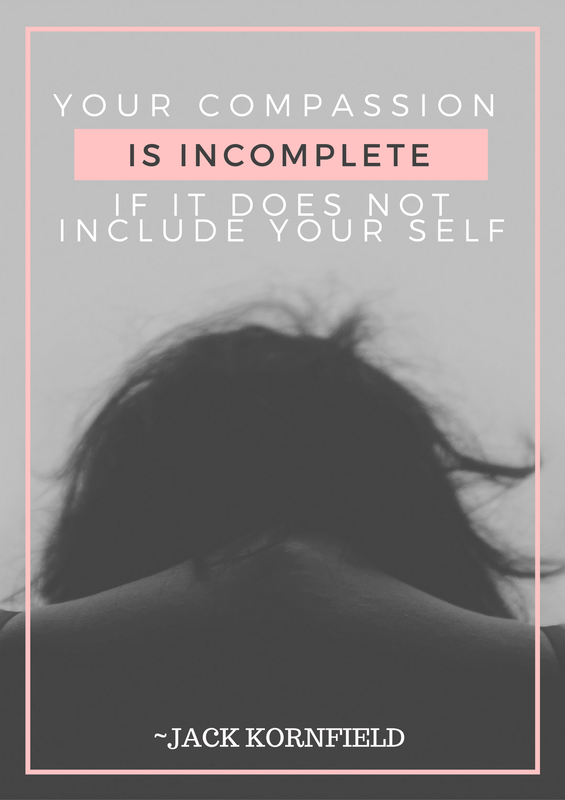|
I'm an addict. And so are you... Let me explain.
I was fortunate to attend the International Yoga Festival in Rishikesh this past spring and I was just reading through my journal from the trip. I took a 2-hour class led by Tommy Rosen called The Wonderland of Your Consciousness, and near the beginning, he said, "I'm an addict. Raise your hand if you are, too." I felt safe from this label and awkwardly looked around at the other yogis, wondering how many self-identifying addicts would be sitting in this room on a muggy morning in the Himalayas. A few people gingerly raised their hands. Then Tommy said, sweetly but bluntly: "You're an addict. We all are. Whether you're addicted to status, people, your habits or routines, food, material goods, creating an image for yourself - whatever it is, there's always something." I was initially taken aback by this, because I had always thought of these attachments we have as invisible threads that tie us to our desires (rather innocent, I suppose). But Tommy was framing the idea in such a way that I couldn't ignore the actual result of letting your attachments go unchecked: addiction. Our culture is so quick to judge and vilify the obvious addicts, assuming these people are somehow lesser than us because they've simply given up. But I know it's not that simple: they are us. There are still so many people struggling with addiction behind closed doors, and many others who have yet to identify or acknowledge their own addictive patterns. As Tommy believes, likely all of us are struggling with our own addictions, at some level. When I was younger and first starting my yoga practice, I used it as a way to replace some of my bad habits (substance abuse and self-deprecation, particularly): a cleaner alternative. But I was using yoga in a large part as a method of punishment, and also, I think, as some way to atone for whatever it was I felt I needed to make right. I was doing something energetically positive, so I believed, and therefore it had to just be good, plain and simple. But I started to notice that I was an insufferable B without my yoga practice; I'd come to depend on it, but I was doing yoga rather than living yoga. I could also see that I was addicted to a sort of self-immolation ritual: I was practicing Bikram (hot) yoga exclusively at the time, and I just wanted to burn everything in that fire, so I could start over. Every day, every single time. My current addictions tend to be a little less dramatic - I still find myself seeking validation from others to determine my self worth, for example - but the mental work is the same: acknowledge the attachment or addictive behaviour; just try to let it go. My current yoga practice has also changed since the early days: it includes much more meditation, a greater variety of asanas (so I don't get too attached to certain poses), more emphasis on pranayama, and most importantly, an overarching attitude of love and compassion in every moment, with every breath. "Fall in love with the subtle." ~ Tommy Rosen
0 Comments
We're teetering on the brink of something big. Our home is in a critical state, and as the occupants of this planet, we are obligated to act. But the good news is that we do have a choice, and although each individual's impact on the political and socioeconomic climate of the planet may not be immediately apparent, living from a place of love instead of fear will start to make some serious ripples that will reverberate a message of peace throughout the world. Don't join the fist fight or the yelling match. Instead, grab your neighbour's hand and stand up together - no matter your insignificant differences - and respond to oppression with unity and solidarity. When enough of us start loving fully and fearlessly, compassion and empathy will replace greed and fear. We can change the principals that our global society operates from, but we've got to start including one another in the conversation. And this is the most important part: it starts small, first as an idea, then a resolution - it is far more simple and effective than you could imagine: just love. Throughout history, we have heard the same story: "Here's much to do with hate, but more with love" (Shakespeare); "When the power of love overcomes the love of power, the world will know peace" (Jimi Hendrix); "Love is the only force capable of transforming an enemy into a friend" (Martin Luther King Jr.), and "All you need is love." (John Lennon). Okay, we get it: love is the key. So why is it so hard to practice? 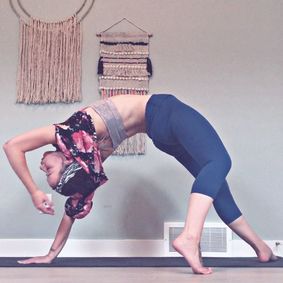 Dr. Brene Brown is a research professor at the University of Houston who spent 6 years trying to answer (through research and scientific studies) the question: what is it that makes people feel a sense of love and belonging? Her Ted Talk on this subject has garnered around 25 million views, which is an indicator of how interested people really are in the topic of loving more fully and feeling more connected. Here is what Dr. Brown found: Whole-hearted people with a deep sense of worthiness had the following attributes in common:
She explains that vulnerability is the real key, calling it a "necessity": a fundamental willingness to be open is crucial in feeling worthy and receptive of love and connection. But what is going wrong? How are we degrading this? We try to numb vulnerability because it makes us feel threatened, but the problem is that you cannot selectively numb emotions, so we numb everything: the joy, hope, and love. We also have a real problem with not knowing the answers, so we attempt to make everything easier to understand (and ultimately, control) by making the uncertain certain: we try to label and define everything so that we can keep an organised mental catalogue of who and what we are able to trust, and who and what we are meant to fear. Categorise - segregate - isolate - we are unwittingly assisting the political empires in their "divide and conquer" strategy. We also attempt to perfect everything, including ourselves and others, and we project those same expectations of flawlessness to those around us (particularly to our children). Lastly, we pretend our actions do not have consequences; if it doesn't directly effect us, we tell ourselves it doesn't matter. So what can we do to be more open and loving? We need to allow ourselves to be completely seen by others. By opening ourselves up and being honest about the beautiful mess that we all are, we start to unconsciously tell others: your weird shit is okay, too. This way we can see our similarities rather than our differences. We also need to love with our whole hearts. Don't be afraid of getting hurt: be afraid of missing out on great love. Find the courage to accept the unknown and move forward with an open and giving heart, despite the risks and challenges. We need to practice gratitude and joy in the face of fear. Rather than focusing on the things that are paining you or holding you back, shift your perspective to the things that you're grateful for to remind yourself that there is always beauty amongst the ugliness. And finally, believe that you are enough. This is the single most important step toward becoming a whole-hearted person. The current global climate of hate, fear, division and destruction is a product of our collective consciousness. Too many of us are terrified and feel defeated, and this is what the political giants are counting on. You do have the power to effect change - we are not helpless to the choices of our governments. But even if you don't believe that living from a place of love and openness is enough to change the world, make a conscious choice to live this way for your own peace and happiness. And over time, you won't be able to ignore the positive impact you're making on the world. I want to offer you a simple mantra for the week:
“I will love myself more completely.” Last week was a bit rough, but it brought me to this mantra and I wanted to share my humbling experience with you… maybe you can relate. This weekend, I felt the urge to disconnect myself from social media. I hated every photo and video I took, and I didn't really want to post anything because every caption I attempted felt vapid and inauthentic, and it seemed more responsible to suffer in silence until I was able to articulate my struggle with more clarity and less emotion. I really wanted to cancel all of my classes and avoid all of my obligations - I didn't know how I was going to offer a proper yoga class to my students while I felt like I was falling apart myself. At one point, I felt so defeated that I even contemplated whether it would be better for my mental health to drop Sarasponda Yoga altogether and find a more “normal”/private alternative for work. I love my job and I value the personal growth I’ve experienced through the process of developing Sarasponda Yoga more than I can express. I feel immensely blessed to be able to do the work that I do, and I can generally handle the roadblocks and bumps along the way with patience and steady focus… but not always: certainly not always. After a couple of really difficult days, (a combination of situational stressors, health concerns, and vague-in-cause-but-overwhelming-in-effect sort of moodiness that turned out to be mainly hormonal) I found myself falling back into old, unhealthy habits of obsessive negative self-talk and debilitating doubt. I became fixated upon and consumed by my stress, and I began spiralling deeper into fear and insecurity until I ultimately questioned a bunch of my actions and decisions, part of that being my relationship with social media. I asked myself whether my Instagram account had become an unhealthy tool for me in forming, classifying, and sharing a significant part of my identity and determining my self worth. I could see that I was harshly judging, criticizing, and comparing myself to others, and simply recognizing that made me feel even more anxious and depressed - it made me feel like a failure. We generally give ourselves so much grace when we suffer physical injury, but any decline or blow to our mental health - even momentary or passing - often carries with it an element of shame and feelings of failure or inadequacy. I think this is true for all of us, but I suspect it is an even greater issue for those who work in the wellness industry. Many of us expect ourselves to be invincible, or immune to bad moods, because, most simply put: we know better so we should do better. We expect ourselves to deflect bad vibes because we can (and do) teach others how to shift their focus toward gratitude and compassion when negativity takes hold. Perhaps I shouldn’t speak so broadly or make these assumptions, but I know that I am personally guilty of feeling ashamed about being in a terrible mood or spending the day in bed, crying and feeling sorry for myself. I know it’s unreasonable to expect myself to always be some highly attuned, inspirationally harmonious, aspirational version of myself, and yet, there I was. It took a couple of days of mental and emotional redirection - a meditative practice, in essence - along with a sweet pep talk from my love, lots of yoga practice, and a couple of good nights of sleep before I was able to fully crawl out of my slump. It’s a process, and it requires constant compassion and forgiveness toward yourself. Cam kindly reminded me of a couple really important points while I was in the depth of my sadness and self-pity. The first was a message from the Tao te Ching, that “people usually fail when they are on the verge of success”, or essentially that the climb up a mountain gets steeper near the top, so it’s important to stay focused on the peak. A Pema Chodron quote also comes to mind: “When things are shaky and nothing is working, we might realize that we are on the verge of something. We might realize that this is a very vulnerable and tender place, and that tenderness can go either way. We can shut down and feel resentful or we can touch in on that throbbing quality.” The other thing he told me was that everybody has a bad day once in awhile, and it’s normal and totally fine to want to spend an afternoon crying in bed. He reminded me that it’s okay to not feel okay, and we all have permission to acknowledge our own pain. In that, I recognized my own gentle advice to my yoga students to allow themselves to acknowledge the full breadth of their experience without judgement. And then he said, “give yourself the same kind of love that you give to others.” And there it was: the simple lesson from this shit-storm of stress and anxiety that I had, up until that point, let myself feel wholly overwhelmed by: “I will love myself more completely.” Self awareness and self love are practices that are dynamic and changing and unpredictable, and never without struggle or apparent setback (it’s not: it only feels that way). The point is not to halt your suffering; the point is to find a way back to your own gentle love and grace through the suffering. I found you nine years ago on an Indian beach and I loved you instantly, completely. Though I had a companion on that trip, I was utterly alone, and that is exactly why we met, then, as we did. I was so young and already felt so defeated; my life was not following the course I'd so desperately tried to fix it upon and I was overwhelmed with depression. That morning, when I walked down to the beach to meet you at sunrise - our first date - I was so nervous, but you quickly reminded me that we've been together for lifetimes already. I knew almost nothing about you and yet, I felt it all; this was definitely a reunion with a great love. After our first date, I walked along the shore for what felt like years and an instant all at once. I was alone, and I I felt so connected to everything - the morning sun, the steady waves of the ocean, the bustling village nearby, and every colour, smell, and sight around me - a great cosmic embrace. I kept thinking about the way you made me feel; you'd gotten in deep and I knew it. You asked nothing of me and showed me the depth of my power and grace when I believed I had nothing left. And you have continued to do this, unconditionally, for the past nine years. I haven't always given myself to this relationship the way I should. I haven't been present at times. I've abused my body and my spirit and have allowed others to do the same to me. But every time I came crawling back, you only ever whispered, "I love you, and it's okay." When I feel exhausted by the trials and tragedies of living, you gently remind me of the incredible beauty of being human. Every single time I've fallen, you've brought me back to my feet. Every time I think I've messed something up, you show me that I'm learning and growing rather than failing and flailing. You've taught me a thousand lessons about love and a few about loss. You point out my power whenever I misplace it. You've shown me how to trust, forgive, let go, move on, and begin again, over and over and over again. YOGA. Union. Eternally intertwined, in bliss. I read an article some time ago (2 years, maybe?) about a study on how humans reflect on our lives. (I can't recall where I saw this, so if you know what I'm talking about, please send me a link!) Basically, the study concluded that people tend to reflect on their own current or most recent period (I believe in this particular study, that was about 1-3 years) as the most difficult or stressful time of their lives. I remember feeling simultaneously saddened and hopeful after reading this article: sad because the study suggests that we (adult “Westernized” humans) have a tendency to focus more heavily on the negative aspects of our memories, but hopeful because it also suggests that this is more a product of faulty thinking than an actual pattern. When any pain is still relatively new, it tends to feel disproportionately deeper. (Think about how often we complain, "This is the worst!") Breakups can feel excruciatingly painful when they're recent, but years later, we might laugh about how things ended, noticing the humour and beauty in everything when our perspective isn't so clouded by pain. (I realise there are some losses that are deeply painful and I don’t mean to minimize that here.) I lost my job around this time last year, and although it felt awful while I was going through it, I was eventually able to see it as the best thing to have happened to me in a long time; it was the last push I needed to fully invest myself in Sarasponda Yoga. I resolved to put my best effort forth in developing my private yoga business and I was able to meet my goal of being fully booked within 6 months. In the beginning especially, I spent a lot of time reading, writing, sequencing, meditating, practicing yoga, working through injuries, completing additional yoga training courses, and looking for a community. As always, there were bumps along the way: a few fairly serious ones but most very minor. Overall, I had a great year. I don’t write this to be condescending, insensitive, or rude, so please forgive me if it comes across that way to you. I’m telling you my own most recent story to remind you that life isn't linear and organized for most of us, and it often doesn't care about our plans; we all have ups and downs to maintain the natural balance of our lives. I definitely would have told you that 2013 and 2014 (and probably most of 2015, to be honest...) were "the worst" years of my life (and I probably did tell some of you that!). Looking back on them now, I'm still not laughing about any of it; however, I can certainly see the value of the lessons I learned during my most difficult times. If this past year felt terrible for you, I urge you to find a little hope and just resolve to move on from here. Whether 2016 was amazing for you, or the worst that you can remember (or anywhere in between), now is a really good time to reflect on the past year. This shouldn’t feel self-critical, judgemental, or even overly analytical; instead, take a moment to identify the things you would like to change in your life, as objectively as possible. If you’re holding on to deep emotions that are no longer serving you, now is an opportunity to try to let them go. Reflect on the things that made you feel good about yourself, hopeful, inspired, loved, purposeful, and set the intention to cultivate more positivity in the coming year. Try this healing and clarifying meditation before the New Year: Find a quiet spot where you can sit comfortably, using pillows, props or furniture as needed. Sit down and bring your legs into a comfortable position. Draw your belly button toward your spine to support your upper body with your core. Rest your hands on your knees and relax your shoulders. Close your eyes and relax your face, including your jaw. Start with natural breathing, in and out through your nose, being mindful to take deep breaths from the belly. Without thinking too hard, imagine yourself “taking in” the qualities you feel you need right now on the INHALE (love, forgiveness, courage, determination, etc). ~Like your yoga and other breathing practices, this meditation should be unique to you, so be open to what your heart is telling you to seek. ~ Repeat a similar process on the EXHALE breath, this time “letting go” of anything that is no longer serving you (fear, anger, resentment, jealousy, etc). Maybe you repeat only word in your mind, or perhaps there are a few things you’d like to focus on; as long as it feels authentic to you, you’re doing it right. Repeat this process for 10 breath cycles (inhale and exhale), then attempt to empty your mind and focus only on your breath for a few minutes. Close your meditation by setting intentions for the year to come. These can be as specific as you’d like, or as general as “be kinder to myself.” (Which I personally believe is a fantastic intention for everyone to adopt!) If it feels helpful, make a list so that you can stay focused on your intentions, resolutions, or goals for the coming year. This is another opportunity to “start over”, so to speak; you can decide what sort of life you’d like to create from here on out. I wish you all the utmost joy, love, and happiness in 2017. Happy New Year, yogis! 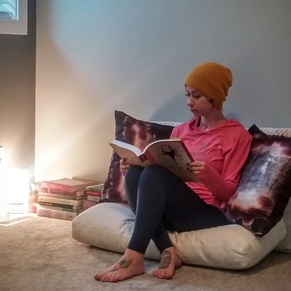 When I decided to begin teaching more than the Bikram 26&2 yoga sequence, I knew I'd have to work hard to learn as much about various types of yoga and their differing approaches, new postures, modifications, and so on, as I possibly could, so I decided to dive right in and get my hands on as much information as possible. I bought some books, read through numerous articles in yoga journals and studies in scientific papers, watched dozens of YouTube videos and skimmed various yoga blogs and websites. I made a ton of notes and filled a binder in no time. I spent hours every day reading and researching, and would then apply the things I'd learned to my own programming and teachings, refining my processes as I went. I also completed two online yoga courses this year, and I will be attending the International Yoga Festival in March of 2017. I have looked into other yoga certification programs, but at this time, it makes more sense for me to continue with self-directed learning and the occasional workshop or event, and if I'd like to dive deeper into one area more specifically with the experts in the field at some point, I'll make that decision when the time comes. Not having much money is no longer a barrier to learning; there is so much information available online, I believe you can learn just about anything you want if you're determined and committed enough. One of the most valuable things I've gained from my yoga practice is my improved discipline and dedication to the things in my life I know to be important. I teach yoga as a career, and I practice alongside my clients while also verbally queuing them through postures and movements. This is a relatively high physical requirement (I currently teach 2-4 classes per day), so it's imperative that I keep my body healthy and strong; I eat a mostly vegan diet, drink a lot of water, sleep 8 hours nightly, and try my best not to get sick! But this also requires me to know my material inside and out so that the practice flows as it should. I have to dedicate time to continued learning in my field so that I can feel confident in my ability to offer my clients the highest quality instruction possible, so they always feel they're getting the best value for their money. Having taught at many different yoga studios and now at my local gym, two of the most common concerns I've heard from studio owners and yoga students is that they aren't learning enough new material, or that the teacher's posture ques aren't clear enough. I've also taken a few classes where some poses are being called by the wrong names or taught with improper form and direction. We all have room for improvement, and I'm certainly nowhere near perfect as a yoga teacher, but I think that we have a certain obligation as instructions to ensure we're providing accurate information, and also that we're teaching it to the best of our ability. As someone who started her own yoga practice (and teaching career) in a lineage that focuses exclusively on 26 Hatha yoga asanas in the same sequence every time, I certainly understand the value of focusing your energy on a single point with full commitment, and I try to take this approach when I'm teaching myself new postures, transitions, or sequences to incorporate in my classes. I've learned the hard way that you can definitely fall flat when trying out something totally new in the middle of a class, and I prefer to reduce those awkward moments as much as possible by working things out on my own before presenting them to my students as lessons. Regardless of the style of yoga you teach, I think there is always something new to be learned, and we all have more room to grow as both teachers and students. There are so many great yoga books, websites and blogs out there with tons of information for teachers. Even social media has a wealth of knowledge, if you look in the right places! Read more for some of my favorite books, yoga websites and videos, and social media yoga accounts that offer high quality information in easy to digest forms. Happy learning, yogis! Progress isn't separate from failure. In fact, if you don't allow yourself to fail in some way, your progress will be more limited. The expansiveness of being allows for incredible change and growth, but the more expectations we put on ourselves and the rigidity to which we hold ourselves to them can determine to a great extent how much farther we're able to go. When you struggle with something, try not to automatically label it as a problem, roadblock, set back, or limitation; instead, consider that there might be some other serious work happening inside your body, mind or heart, and that the universe is just taking care of your physical experience while you sort through your internal cosmic shuffle. You don't need to have all the answers, you don't have to appear better than you were yesterday, and you certainly don't need to hold yourself to anyone else's standards. Be gentle and patient with your practice (and your life!), and extend your compassion to fully include yourself. You're worth a whole lot and you deserve the adventure of discovering that for yourself. The above passage was just a caption in one of my Instagram posts, but I was struck by it again today, after waking up feeling like I've been hit by a truck. Not only have I caught a bug, but the house next door is being framed and it's VERY LOUD. Sometimes life nudges you toward backing off a little, just to maintain the overall balance of things. All we can do is listen, and respect the messages we receive. So it looks like I'll be spending the day in bed! |
